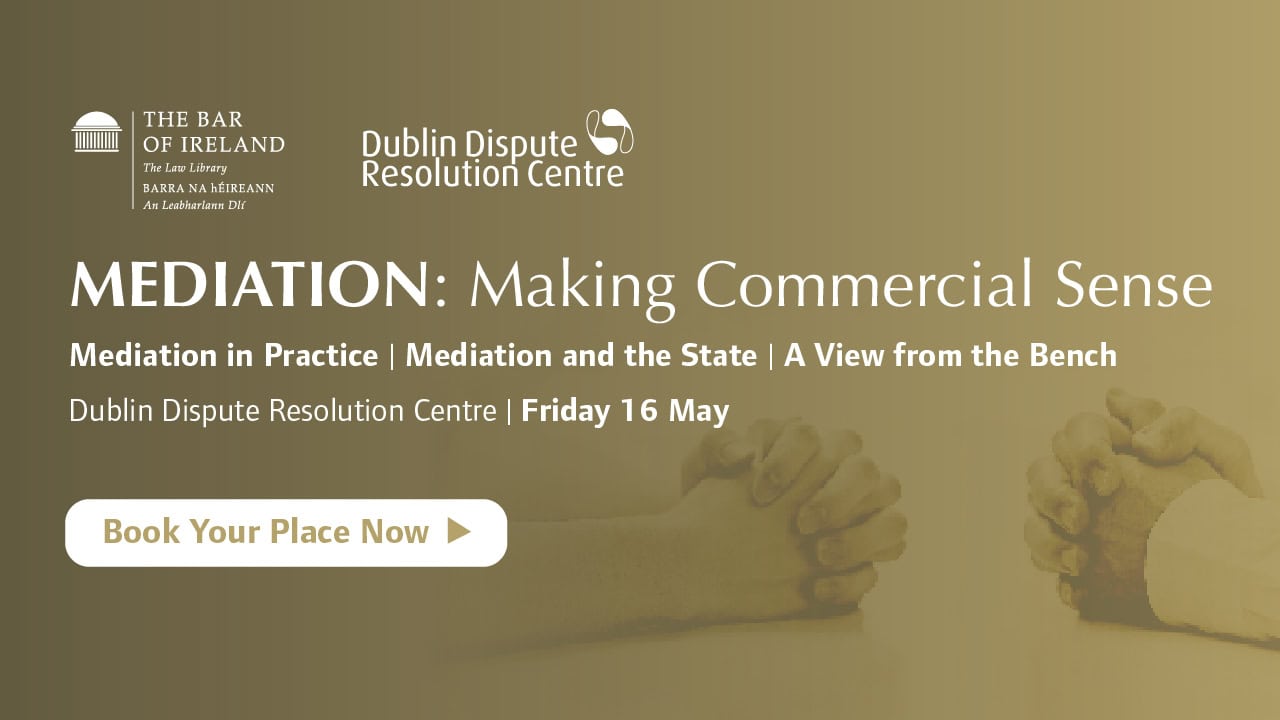Shareholder disputes over management or company direction can lead to costly litigation. Alternative dispute resolutions preserve business relationships and avoid prolonged legal conflicts.
Written by Arran Dowling Hussey BL and Catherine Needham BL
Shareholder Disputes: What are they?
There are a wide range of disputes that emerge when relations breakdown between shareholders.
A non-exhaustive list that can arise include:
- minority shareholders excluded from the management of a company;
- a group of shareholders acting so as to harm the interests of other shareholders;
- a shareholder-director may be acting fraudulently or otherwise in breach of duties owed to the company; and
- shareholders may disagree on the company’s future direction.
If there is no pre-established process for resolving disputes, these conflicts will typically be settled through litigation. Although mediation and arbitration have become more popular in recent years, increasing their use in these situations would generally be advantageous for those entangled in shareholder disputes.
Traditional court litigation is usually longer and more costly than mediation and arbitration and unlike the latter two processes is conducted in public.
How disruptive can shareholder disputes be?
One recent example of a shareholder dispute can be seen in the case of Mascarenhas v Karim & Another. Tiago Mascarenhas brought an application claiming shareholder oppression, in relation to a company running an English language college in Dublin. The difficulties between the parties arose in 2015 and proceedings were issued the following year. It took until 2019 for the case to be concluded in the High Court. The Court of Appeal judgement was then issued in March 2022 around 7 years after the parties relationship broke down.
The financial (and time) commitments arising from a dispute running this long would obviously be most considerable. Proceedings in this case were issued the year before the 2017 Mediation Act brought the use of this Alternative Dispute Resolution (‘ADR’) method to the fore.
For more on the benefits of mediation for business disputes, join The Bar of Ireland’s Mediation Conference on 16th May. Register here

Best (alternative) tool for the job?
Mediation is a ‘user-friendly dispute resolution method. Consistently over the years, in a range of countries, research has shown that the process has a success rate of between 60-80%.
Mediation is a consensual process that requires both sides to have a bona fide intent to try and resolve the dispute under the framework of support a mediator can provide. It is hard to have an ongoing relationship after potentially years of litigation is pursued on a win/lose basis through the courts. Mediation can avoid or minimise the bitterness of shareholder disputes which may involve longtime friends and/or family members who have worked together for some time.
However, as in Mascarenhas, one of the parties can decline to mediate. As a consequence of this refusal they were, as allowed for under the Mediation Act 2017, penalised in the costs order made by the Court of Appeal. With each year that passes, there is be a growing awareness of the risks of refusing to mediate in such circumstances.
Tiered Dispute Resolution?
Along with mediation, the best-known ADR method is arbitration. When it works at its best, arbitration is quicker and cheaper than litigation. Arbitration is an adjudicative process similar to litigation, but it results in a final binding decision that can not be appealed.
The finality this brings will be attractive to those who may find themselves involved in an elongated time frame such as was seen in Mascarenhas. Arbitration can be used on its own or as part of a tiered dispute resolution process known as ‘arb-med’ or ‘med-arb’. It is probably the case that with the majority of mediations that do not succeed that the parties resume litigation in the High Court. Unless the case is in the fast-track Commercial Court, the case may not then progress with particular speed and there is the risk of the loser bringing an appeal.
However, if the unsuccessful mediation is bookended by an arbitration, matters will conclude more quickly. Indeed, the parties may agree to ‘expedited arbitration’ and can follow defined time periods such that they can have a 100-day arbitration.
For more on the benefits of mediation for business disputes, join The Bar of Ireland’s Mediation Conference on 16th May. Register here
The Case for Mediation
Mediation can be a remarkably successful dispute resolution process which often, but not always, sees an agreement that resolves the differences that have arisen between shareholders. Many shareholder disputes involve friends or family members who have started a business. It can be especially difficult in the shadow of years of court applications for there to be any chance of a continuing relationship. Mediation a party-driven facilitative process, which is confidential, quicker and cheaper than the courts, can be used on its own or in conjunction with arbitration to settle shareholder disputes expeditiously.
For more on the benefits of Mediation in resolving Business Disputes, attend The Bar of Ireland’s upcoming conference – Mediation: Making Commercial Sense – on the 16th May

